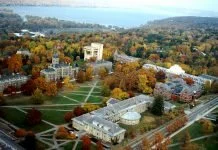This post is brought to you by IvyUntold. To view the original post, click here.
During the summer time, my good friend Jordan approached me about writing my story. He asked that I take some time and transcribe my Ivy League experience. Jordan explained that he wanted to create a website that would expose the world to the diversity of experiences that are had by Ivy League student-athletes, and he felt that my story was one that the world should know about. I felt honored to have been asked to do this and I wanted to produce a testimony that was not only eloquent, but authentic and pure. With this intention in mind, I sat down more than a few times and failed to transcribe what I believed was the correct document. Yet, here I am again, please bear with me.
I am a black man. I am an Ivy League student athlete. Please understand that being a black Student Athlete in the Ivy League forces one to have the same sort of Double Consciousness that W.E.B Dubois describes in “The Souls of Black Folk.” Black student athletes in the Ivy League do not have the luxury of perceiving themselves strictly as Ivy League athletes, because at the same time, they must also consider themselves black student athletes. I will write about both consciousnesses in this reflection, beginning with the former; the more popular one.

I was born in 1994, in East Baltimore. My parents met in high school and my mother continued on to college where she received her degree in nursing. My father chose to enter the Air Force after high school and he became a firefighter. My father is still a firefighter and my mother is still a nurse; my parents work hard. When I was young, my parents decided to send me to the best private school in Baltimore City, Gilman School. I attended Gilman School for 12 years, meaning my parents paid for my private education for 12 years. I will never be able to repay my parents for this sacrifice, though I must admit that in my wildest dreams I find a way to come square with them and we live happily ever after.
Going to Gilman School afforded me the opportunity to learn in the best facilities in the city, with wonderful teachers, and around very intelligent classmates. Going to Gilman allowed me to play for the best football coaches in the country, to train my body in exceptional facilities and to play on National Television. My parent’s sacrifices made all of this possible. Often, we are taught to believe that we are the reason why we are successful, but there is so much more to it. Allow me to confess that being an Ivy League athlete is a blessing. I am filled with pride when I reflect on my journey. Yet, my pride soon turns to gratitude because I realize that I am where I am because of God and because of my support system. My support system (including God) has elevated me to where I am in life right now.
As a student athlete at Cornell, you have a lot of early mornings. The University has accommodated its student athletes by requiring that all classes occur between 8:05 a.m. and 4:25 p.m., so that there are distinct times that teams can train without their students missing classes. Waking up at 5:15 a.m. on a Tuesday is never fun, but it centers you. It is cold and quiet in Ithaca at 5:15 am, and there is something about knowing that you are about to put 500 pounds on your back that forces you to reflect. I ride to morning workouts or meetings with my roommates and there is seldom a word spoken, we are reflecting. Internally, we are asking, “why?” In most cases, we were up until 1 a.m. the night before, finishing assignments, or supporting each other through the process, and in most cases we have class when workouts are over. During our silent car rides, I am thinking about when my next opportunity to sleep will be, or how I wish Cornell had been located in a more tropical climate. But, the “Woe is me” routine always ends when I think about my mother. My mother gets up every morning, prepares my sisters for school, prepares herself for work, goes to work, tends to my grandmother, and then returns home to fulfill her “mom duties”. The worst part is, she has the nerve to empathize with me when I complain about how busy I am. I go to class because I owe it to my mother; I do my homework because I owe it to my mother.
At the same time, I know that I would not have been accepted into Cornell without football. In addition, there is no way that I would be half the athlete that I am today if it were not for my father. Our humble home in East Baltimore rests directly across from a football field. I spent many a summer morning there with my father, pulling tires, and running stadium stairs. The lessons that I learned at that field were about more than physical fitness. One particular story, that lives on with me, as if it occurred yesterday goes like this… We had been working out for about an hour at the field and I had had quite enough. I knew that once I finished working out, I would get breakfast and then go straight to my grandmother’s house to swim in her pool. I did not want to run any more routes, catch any more balls, or do any more pushups. I wanted to go swimming. Finally, I broke out into tears. My father looked at me for a few seconds, and then he left. He walked across the street and into the house. The only thing he said was, “there is no reason for you to be crying, I am not punishing you, and this is what you wanted. You said you wanted to be good at football.” I remember watching him walk across the street and realizing that he was right. I was still at the age where walking across the street was intimidating, so I was not quick to run after him. I took a seat on one of the benches and I thought about what he said. I laced my shoes back up, and ran a few more stadiums. I do not remember what occurred once I walked into the house, but discipline means a lot to me because of these moments. To this day, when I am struggling to finish a workout or a practice, I imagine that my father, my mother and my sisters are watching me, and I make it through.
Now for the second consciousness…
I must point out, that as a black Ivy League athlete, my experience at Cornell has been significantly different than that of my white counterparts. As, a black student athlete in the Ivy League, one must always, “look at one’s self through the eyes of others” as DuBois says. For example, coaches will always explain to their players, that each of them must carry themselves throughout the University understanding that they represent their team at all times. Yet, a black student athlete must carry himself knowing that he represents not only his team, but also his race. A black student athlete knows that if he acts disrespectful around campus, the report will not be that a football player was acting disrespectfully, but it will be reported that a black football player was being disrespectful. For this reason, as a black student athlete you constantly bear the responsibility of positively representing your race, on and off the field. As a result of this, black student athletes in the Ivy League must always consider how other people are viewing them.
What I have just explained may seem extreme, so let me provide an example to make this concept seem more real. Whenever I return to Baltimore during scheduled breaks from classes, I am often greeted like a walking contradiction. Pretty often, I will encounter white people, who upon seeing my Cornell garb ask in astonishment, “You really go to Cornell? You must play a sport right?” I always want to answer this question with a specific J Cole line, but I refrain from reciting it to them for the same reason that I will refrain from reciting it to you, because it is too explicit and after all, I am an Ivy League gentleman. Anyway, whenever I encounter this question, I answer politely and assume that the interrogator meant no harm by their question.
Whether they meant harm by their question or not, it is important to consider their actual question; what did the person asking the question assume about me and what did they actually want to learn? So let’s break the question down in hopes that it will bring us closer to an answer. Was the interrogator surprised that I attended Cornell because it is a difficult school to earn acceptance into? Or because I am a black man? Or both? Before finding the courage to ask me the question in the first place, they must have thought to themselves, “there is no way that that big black dude with the nappy Mohawk could possibly have the intellectual aptitude and competence to make it in the Ivy League, there must be some mistake.” Right? Next, did they assume that I must play a sport because I am larger than the average man? Or because there was no way that I could have excelled enough academically to have matriculated to an Ivy league institution? I don’t think it is fair for me to answer these questions myself, but I think it is important to reflect on these questions when trying to understand what it means to be a black Ivy League student athlete.
As black student athlete in the Ivy League, you can expect to have days with morning practice at 6:00 am, followed by three classes in which you are the only Person of Color. After class, you could have another hour and a half of sport specific meetings, followed by a trip to the dining hall before retiring to the library until midnight. The life we live here is not glamourous, and at times, it does not seem fair. This season, my senior season, was supposed to be the culmination of my entire journey as an athlete, it was to be wondrous. God had different plans. The real plan was for me to fully tear my right Achilles tendon on the first day of training camp, and to miss the entire season. Looking for the “fairness” in this situation is useless; it is a road that leads to nowhere. Therefore, lets agree that fairness is not for what we are searching or requiring. As a black Student Athlete in the Ivy League you take it as it comes and above all else, you are grateful, and the only thing you truly require is the best from yourself. You are grateful for all those that came before you and paved the way and you are grateful for all of those that will carry the torch after you have played your last down and received your diploma. You are grateful for the sacrifices of your family and you are grateful to God. Cornell is a wonderfully imperfect place, and I am so fortunate to be a black student athlete here.
Miles Norris
Cornell University CO ‘17 (winter)






